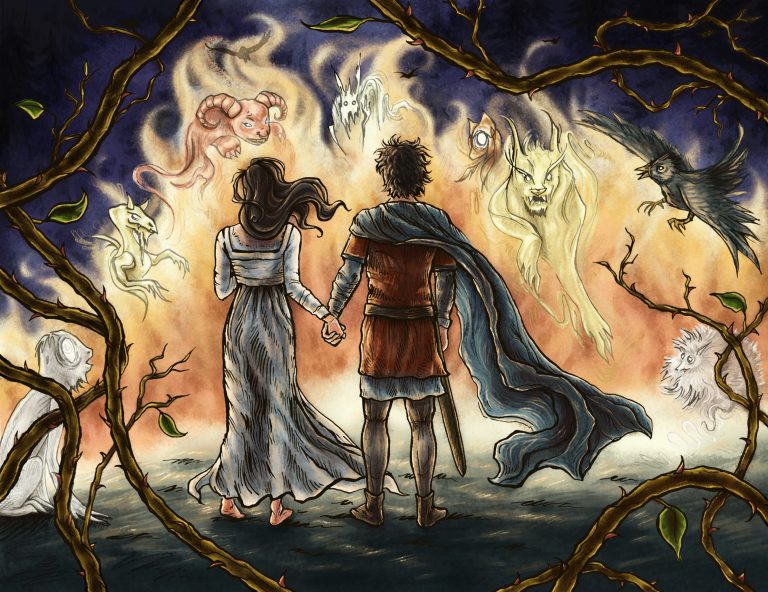The Fairies of Bruan Broch

The Bruan Broch was open and within it the men could see hordes of tiny people dancing to their hearts’ content. It was a ceilidh quite unlike they had ever seen before and one of the men, being so entranced by the wondrousness of it all, leapt to join the party.

By David White
This story is set in the small crofting hamlet of Bruan, in Caithness in the North-East of Scotland. One Hogmanay many years ago, two men were hastily carrying a small keg of whisky past the church of Bruan on their way to their families festivities when they were stopped in their tracks by the sudden onslaught of bagpipes and fiddles. They thought this was odd, given there were no houses around, but they ventured on and in a few hundred yards the source of this raucous music revealed itself. The Bruan Broch was open and within it the men could see hordes of tiny people dancing to their hearts’ content. It was a ceilidh quite unlike they had ever seen before and one of the men, being so entranced by the wondrousness of it all, leapt to join the party. The other man, being slightly more experienced in life, had heard talk of fairy hills and the ill fates that often resulted from entering them and so hesitantly held back, but being ever the faithful friend waited for his companion to have a dance. After a few hours passed, he went to check on his friend, and peeking through the doorway he saw him standing there smiling, clearly still infatuated by the otherwordly Hogmanay party he had joined. Shouting out to him he said:
“It is time to head, the guests will be getting thirsty.”
But the other man, not releasing the passage of time, curtly replied:
“I still haven’t had my dance, we shall be on our way soon enough.”
With that, his friend plonked himself down to wait a while longer, cracking into the barrel of whisky to pass his time, but as the the ground started to tilt beneath his feet and the early morning light cast a dull illumination across the hills, he thought he had better head for home, regardless of his companion’s failure to emerge from the hill. Arriving home, he provided the remaining partygoers with a healthy drink before passing out in his chair by the fire, much to his wife’s consternation.
The next morning he awoke with a somewhat aching head, filled himself on the leftovers from the feast the night before, and headed out to check that his friend had arrived home safely. His friend’s wife had reported, however, that he had not made it home and so he went off to the Broch to fetch him back but upon arriving there was no sign of a door. The hill appeared ancient, untouched since the Picts ruled the land. He started to wonder if the whole evening’s events had been but a figment of his drink-addled brain and so he returned home, hoping his lost companion would soon reappear. But as the days and weeks drew on, he did not. The man’s thoughts of that evening’s events had started to fade until one day when the discussion around the hearth turned to that of lost family members the man recalled a story his grandmother once told him about fairy hills, within it contained the insight that fairy hills would open up at the same date each year. With that, the man planned to visit the hill at the same time on Hogmanay that year to attempt to free his friend.
Hogmanay quickly came around and the man sprung into action. As his grandmother had said, the fairy hill had once again opened with golden light and music pouring out of the opening, just as it had the year previous. The man over the year he waited for his friend, had time to think upon other knowledge he had of the good folk and recalled their weakness to iron and so in cautiously approaching the door to the hill he put a heavy iron bucket in the path of the door, in case the fairies might try to slam it shut before he could retrieve his friend. Once everything was in place he called out to his friend:
“You must be ready to come home by now!”
But as before his friend curtly replied:
“I still haven’t had my dance, we shall be on our way soon enough.”
At this point the man realised what had happened, time passed slower in the fairly realm, a night there could be many years in the mortal realm, he even knew of a tale of a fiddler who had gone to one of these fairy ceilidhs to play for them and had left the hill 100 years in the future thinking but a night had passed. He explained all of this to the man still waiting his turn for a dance, although he refused to believe him. With the man, seeing his opportunity to save his friend diminishing before his eyes, decided to take radical action. He rushed into the fairy hill, grabbed his friend’s arms and heaved him out of the door, kicking the bucket on the way out. With that, the door to the hill slammed behind them.
As the men wandered back home, the one who had been ensnared by the fairy trap still refused to believe he had been away for more than a single hour, although when he arrived home to a young child who barely recognised his face and a wife whose visage had gone as pale as a sheet, he was faced with the insurmountable proof that he had fallen prey to the trickery of the Guid Folk.
Adapted from Folk-Lore Gleanings and Character Sketches from the Far North by Rev. George Sutherland



